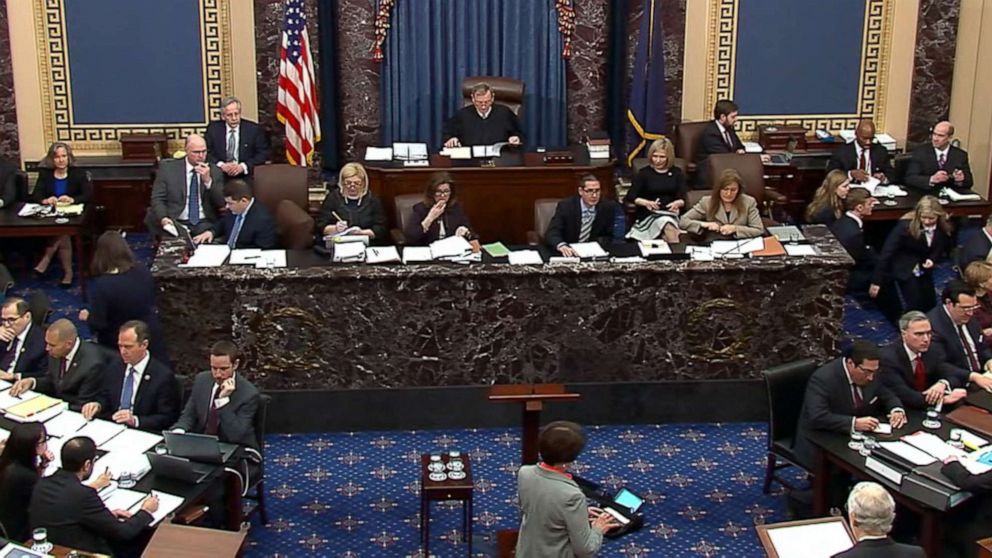Impeachment
The new European data protection law requires us to inform you of the following before you use our website:

Senate Majority Leader Mitch McConnell on Friday sent a letter to GOP senators sharing a summary of how the upper chamber could legally prevent President Trump's impeachment before Jan.
We use cookies and other technologies to customize your experience, perform analytics and deliver personalized advertising on our sites, apps and newsletters and across the Internet based on your interests. By clicking “I agree” below, you consent to the use by us and our third-party partners of cookies and data gathered from your use of our platforms. See our Privacy Policy and Third Party Partners to learn more about the use of data and your rights. You also agree to our Terms of Service.
The Constitution gives the House of Representatives “the sole Power of Impeachment” (Article I, Section 2) of federal officers and gives the Senate “the sole Power to try all Impeachments” (Article I, Section 3). In the constitutional procedure of impeachment and removal, the House serves in the role of a grand jury bringing charges against an officer suspected of “Treason. President Donald Trump was impeached by the House of Representatives in a near party-line vote Wednesday. He is still the President. What comes next is a trial in the Senate early next year that.
Impeachment Definition
SECTION 4. The President, Vice President and all civil Officers of the United States, shall be removed from Office on Impeachment for, and Conviction of, Treason, Bribery, or other high Crimes and Misdemeanors.
Annotations
The impeachment provisions of the Constitution839 were derived from English practice, but there are important differences. In England, impeachment had a far broader scope. While impeachment was a device to remove from office one who abused his office or misbehaved but who was protected by the Crown, it could be used against anyone—office holder or not—and was penal in nature, with possible penalties of fines, imprisonment, or even death.840 By contrast, the American impeachment process is remedial, not penal: it is limited to office holders, and judgments are limited to no more than removal from office and disqualification to hold future office.
Impeachment was a device that figured from the first in the plans proposed to the Convention; discussion addressed such questions as what body was to try impeachments and what grounds were to be stated as warranting impeachment.841 The attention of the Framers was for the most part fixed on the President and his removal, and the results of this narrow frame of reference are reflected in the questions unresolved by the language of the Constitution.
839 Impeachment is the subject of several other provisions of the Constitution. Article I, § 2, cl. 5, gives to the House of Representatives “the sole power of impeachment.” Article I, § 3, cl. 6, gives to the Senate “the sole power to try all impeachments,” requires that Senators be under oath or affirmation when sitting for that purpose, stipulates that the Chief Justice of the United States is to preside when the President of the United States is tried, and provides for conviction on the vote of two-thirds of the members present. Article I, § 3, cl. 7, limits the judgment after impeachment to removal from office and disqualification from future federal office holding, but it allows criminal trial following conviction upon impeachment. Article II, § 2, cl. 1, deprives the President of the power to grant pardons or reprieves in cases of impeachment. Article III,§ 2, cl. 3, excepts impeachment cases from the jury trial requirement. Although the word “impeachment” is sometimes used to refer to the process by which any member of the House may “impeach” an officer of the United States under a question of constitutional privilege (see 3 Hinds’ Precedents Of The House Of Representatives Of The United States §§ 2398 (impeachment of President John Tyler by a member) and 2469 (impeachment of Judge John Swayne by a member) (1907), the word as used in Article II, § 4 refers to impeachment by vote of the House, the consequence of which is that the Senate may then try the impeached officer.

/i.s3.glbimg.com/v1/AUTH_59edd422c0c84a879bd37670ae4f538a/internal_photos/bs/2019/c/R/dIfMGRRNS7Low9Taxq1A/000-1kl7ob.jpg)
Impeachment News
840 1 W. Holdsworth, History Of English Courts 379–85 (7th ed. 1956); Clarke, The Origin of Impeachment, in Oxford Essays In Medieval History, Presented To Herbert Edward Salter 164 (1934); Alex Simpson, Jr., Federal Impeachments, 64 U. Pa. L. Rev. 651 (1916).
Impeachment Trial Live
841 Alex Simpson, Jr., Federal Impeachments, 64 U. Pa. L. Rev.at 653–67 (1916).